
Frankfurt am Main is the most populous city in the German state of Hesse. Its 773,068 inhabitants as of 2022 make it the fifth-most populous city in Germany. Located in the foreland of the Taunus on its namesake Main, it forms a continuous conurbation with Offenbach am Main; its urban area has a population of over 2.7 million. The city is the heart of the larger Rhine-Main metropolitan region, which has a population of more than 5.8 million and is Germany's second-largest metropolitan region after the Rhine-Ruhr region and the fourth biggest metropolitan region by GDP in the European Union. Frankfurt is home to the European Central Bank, one of the institutional seats of the European Union, while Frankfurt's central business district lies about 90 km (56 mi) northwest of the geographic center of the EU at Gadheim in Lower Franconia. Like France and Franconia, the city is named after the Franks. Frankfurt is the largest city in the Rhenish Franconian dialect area.
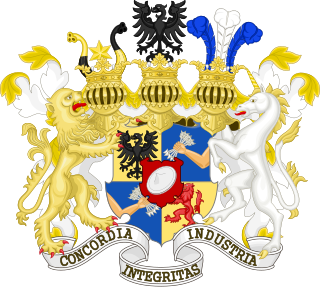
The Rothschild family is a wealthy Ashkenazi Jewish noble banking family originally from Frankfurt. The family's documented history starts in 16th century Frankfurt; its name is derived from the family house, Rothschild, built by Isaak Elchanan Bacharach in Frankfurt in 1567. The family rose to prominence with Mayer Amschel Rothschild (1744–1812), a court factor to the German Landgraves of Hesse-Kassel in the Free City of Frankfurt, Holy Roman Empire, who established his banking business in the 1760s. Unlike most previous court factors, Rothschild managed to bequeath his wealth and established an international banking family through his five sons, who established businesses in Paris, Frankfurt, London, Vienna, and Naples. The family was elevated to noble rank in the Holy Roman Empire and the United Kingdom.
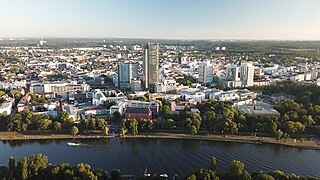
Offenbach am Main is a city in Hesse, Germany, on the left bank of the river Main. It borders Frankfurt and is part of the Frankfurt urban area and the larger Frankfurt Rhein-Main urban area. It has a population of 138,335.

Mayer Amschel Rothschild was a German-Jewish banker and the founder of the Rothschild banking dynasty. Referred to as a "founding father of international finance", Rothschild was ranked seventh on the Forbes magazine list of "The Twenty Most Influential Businessmen of All Time" in 2005.
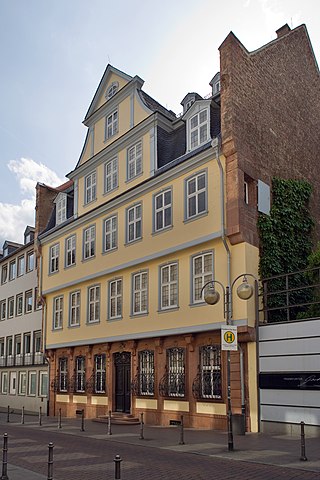
The Goethe House is a writer's house museum located in the Innenstadt district of Frankfurt, Germany. It is the birthplace and childhood home of German poet and playwright Johann Wolfgang von Goethe. It is also the place where Goethe wrote his famous works Götz von Berlichingen,The Sorrows of Young Werther, and the first drafts of Urfaust. The house has mostly been operated as a museum since its 1863 purchase by the Freies Deutsches Hochstift, displaying period furniture and paintings from Goethe's time in the house.
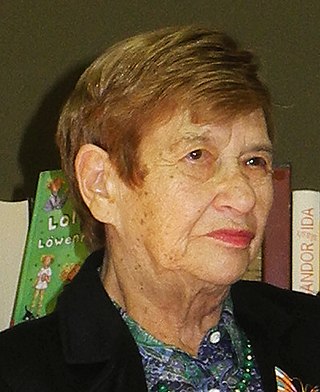
Stefanie Zweig was a German Jewish writer and journalist. She is best known for her autobiographical novel, Nirgendwo in Afrika (1995), which was a bestseller in Germany. The novel is based on her early life in Kenya, where her family had fled to escape persecution in Nazi Germany. The film adaptation of the novel (2001) won the Academy Award for Best Foreign Language Film. Her books have sold more than seven million copies, and have been translated into fifteen languages.

The Rothschild banking family of Austria was the Austrian branch of the Rothschild family. It was founded in 1820 by Salomon Mayer von Rothschild in Vienna, which was then part of the Austrian Empire.
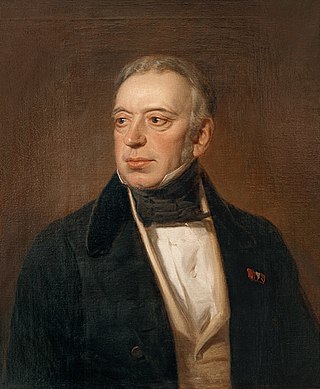
Salomon Mayer Freiherr von Rothschild was a Frankfurt-born banker in the Austrian Empire and the founder of the Austrian branch of the prominent Rothschild family.

The Rothschild banking family of England is the English branch of the Rothschild family. It was founded in 1798 by Nathan Mayer Rothschild (1777–1836), who first settled in Manchester before moving to London, England, which was then part of the Kingdom of Great Britain. He was sent there from his home in Frankfurt by his father, Mayer Amschel Rothschild (1744–1812). Wanting his sons to succeed on their own and to expand the family business across Europe, Mayer Amschel Rothschild had his eldest son remain in Frankfurt, while his four other sons were sent to different European cities to establish a financial institution to invest in business and provide banking services. Nathan Mayer Rothschild, the third son, first established a textile jobbing business in Manchester and from there went on to establish N M Rothschild & Sons bank in London.

Alice Charlotte von Rothschild, otherwise referred to as 'Miss Alice', was a socialite and member of the Rothschild banking family of Austria. Born in Frankfurt, she was the eighth and youngest child of Anselm von Rothschild (1803–1874) and Charlotte Rothschild (1807–1859) and younger sister of the British politician, Baron Ferdinand de Rothschild. She was quite young when her family moved to Vienna, where her father took over the management of the family-owned S M von Rothschild bank.

The Rothschild banking family of Naples was the Neapolitan branch of the Rothschild family. It was founded by Carl Mayer von Rothschild (1788–1855), who was sent to the Kingdom of the Two Sicilies from Frankfurt in 1821.

Carl Mayer Freiherr von Rothschild was a Frankfurt-born banker in the Kingdom of the Two Sicilies and the founder of the Neopolitan branch of the prominent Rothschild family.
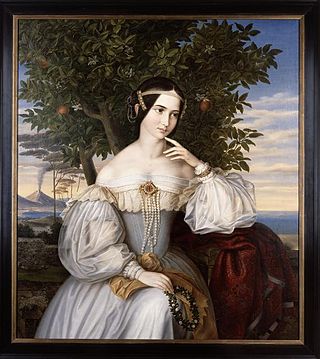
FreifrauCharlotte von Rothschild was a German-born British socialite. She was a member of the Rothschild banking family of Naples.
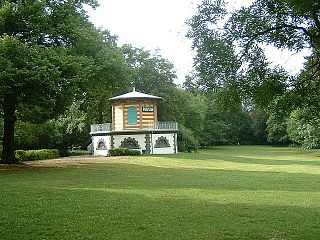
The Grüneburgpark is a public park in Frankfurt, Hesse, Germany, located in the Westend quarter. It began as a park for the Grüne Burg, a castle from the 14th century. In 1789, the banker Peter Heinrich von Bethmann Metzler acquired the property, and had the park designed. In 1837, the property was bought by the Rothschild family, who erected a palace-like mansion in the style of a French Loire palace. They commissioned Heinrich Siesmayer to develop an English garden, completed in 1877. Under the Nazi regime, Albert von Goldschmidt-Rothschild had to give up his family home. The palace was destroyed in an air raid in 1944.

The Frankfurter Judengasse was the Jewish ghetto of Frankfurt and one of the earliest ghettos in Germany. It existed from 1462 until 1811 and was home to Germany's largest Jewish community in early modern times.

OpernTurm is a 43-storey 170 m (560 ft) skyscraper in the Westend-Süd district of Frankfurt, Germany. The property is situated opposite Alte Oper on the corner of Bockenheimer Landstraße and Bockenheimer Anlage. The building was designed by Christoph Mäckler. The project developer was Tishman Speyer, a US firm that previously built the Sony Center in Berlin and the Messeturm in Frankfurt.

The Bethmann family has been remarkable for the high proportion of its male members who succeeded at mercantile or financial endeavors. This family trait began in medieval northern Germany and continued with the Bethmann bank, which Johann Philipp Bethmann (1715–1793) and Simon Moritz Bethmann (1721–1782) founded in 1748 and soon catapulted into the foremost ranks of German and European banks. Even after the bank's sale in 1976, there are Bethmanns engaged in commercial real estate and forestry in the 21st century.
Bethmann Bank AG is a German private bank headquartered in Frankfurt am Main. It is a subsidiary of the Dutch ABN AMRO Bank N.V. and was the product of a merger between the historical German banks Delbrück, Bethmann and Maffei under the umbrella of the renowned Dutch ABN AMRO Bank. LGT Bank Deutschland joined this group in 2011. Bethmann Bank acquired the German private banking activities of Credit Suisse in December 2013. The acquisition positions Bethmann Bank, ABN AMRO's private bank in Germany, as the third largest private bank in Germany.

The Jewish Museum Frankfurt am Main is the oldest independent Jewish Museum in Germany. It was opened by Federal Chancellor Helmut Kohl on 9 November 1988, the 50th anniversary of Kristallnacht.
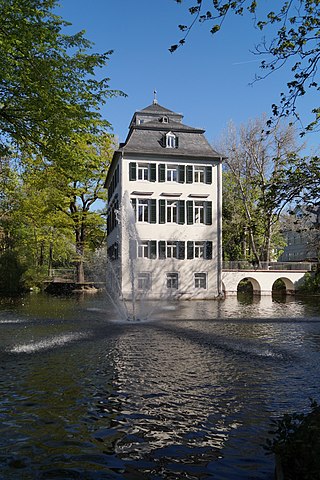
The Holzhausenschlösschen is a moated former country house built by the patrician Holzhausen family on their farm, then just north of Frankfurt and now in the city's Nordend. The present building was completed in 1729, built for Johann Hieronymus von Holzhausen on the foundations of a moated castle from the Middle Ages after a design by Louis Remy de la Fosse. Today, it serves as a venue for cultural events.


















